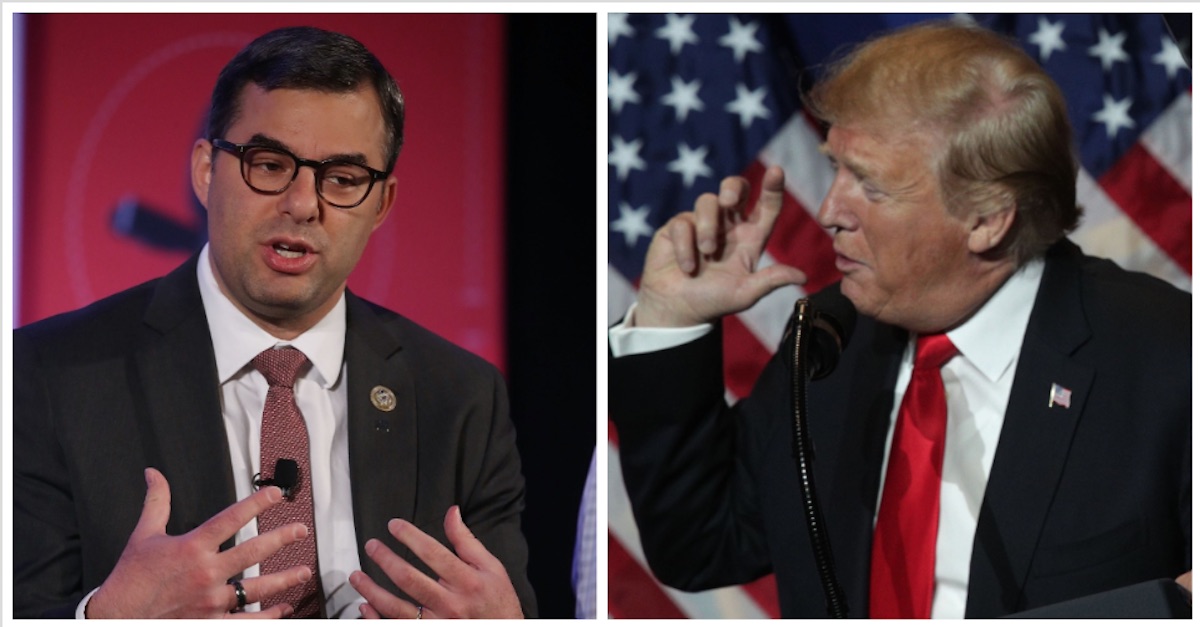
Rep. Justin Amash (R-Mich.) took to Twitter Tuesday to accuse U.S. Attorney General William Barr of misrepresenting “key aspects” of Robert Mueller‘s report on Russian interference in the 2016 election and the investigation into whether or not President Donald Trump obstructed justice.
Amash said that Barr’s letter “selectively quotes and summarizes points in Mueller’s report in misleading ways,” later adding that “Barr used further misrepresentations to help build the president’s false narrative that the investigation was unjustified.”
Amash noted that Mueller’s report purposefully left out any indictment recommendation because of existing Department of Justice policy that does not allow a sitting president to be indicted.
“Barr’s letter doesn’t mention those issues when explaining why Mueller chose not to make a prosecutorial decision,” Amash wrote. “He instead selectively quotes Mueller in a way that makes it sound—falsely—as if Mueller’s decision stemmed from legal/factual issues specific to Trump’s actions.”
Obstruction of Justice
Amash refers in his tweets to how Barr “selectively quotes Mueller” to make it seem that Mueller agreed with Barr’s, and Deputy Attorney General Rod Rosenstein‘s, determination that the president did not obstruct justice. In his letter, Barr stated:
Instead, for each of the relevant actions investigated, the report sets out evidence on both sides of the question and leaves unresolved what the Special Counsel views as “difficult issues” of law and fact concerning whether the President’s actions and intent could be viewed as obstruction. The Special Counsel states that “while this report does not conclude that the President committed a crime, it also does not exonerate him.”
But the report does not make a determination about whether the president obstructed justice. The full context:
Because we determined not to make a traditional prosecutorial judgment, we did not draw ultimate conclusions about the President’s conduct. The evidence we obtained about the president’s actions and intent presents difficult issues that would need to be resolved if we were making a traditional prosecutorial judgment. At the same time, if we had confidence after a thorough investigation of the facts that the President clearly did not commit obstruction of justice, we would so state. Based on the facts and the applicable legal standards, we are unable to reach that judgment. Accordingly, while this report does not conclude that the President committed a crime, it also does not exonerate him.
Barr’s Public Summary Of Mueller Report
Amash next took issue with Barr’s letter, which Mueller himself also had issues with:
Here’s what Mueller had to say about the letter:
The summary letter the Department sent to Congress and released to the public late in the afternoon of March 24 did not fully capture the context, nature, and substance of this office’s work and conclusions … There is now public confusion about critical aspects of the results of our investigation. This threatens to undermine a central purpose for which the Department appointed the Special Counsel: to assure full public confidence in the outcome of the investigations.
A DOJ spokesperson confirmed at the time that Mueller “expressed frustration over the lack of context” in the attorney general’s letter. Mueller was concerned that “the resulting media coverage regarding the Special Counsel’s obstruction analysis.” This is a common tactic that some government officials call “Going to paper” in order to make their own views known on highly contentious issues. Former U.S. Attorney Chuck Rosenberg said that this decision is not done lightly. “You don’t want to box someone in or show them up. You go to paper when you want to make a record for the history books,” he said.
Last month, some Democratic lawmakers also took issue with how Barr framed Mueller’s finding:
The White House Did Not ‘Fully Cooperate’
Amash responded to Barr’s claim that Trump fully cooperated with the investigation by pointing out that the president did not sit down for an interview with Mueller.
Amash stated that the written answers to Mueller were “often incomplete or unresponsive” and Mueller found the answers Trump gave as “inadequate.” Mueller chose to forgo subpoenaing Trump because it would result in a “potentially lengthy constitutional litigation” that would delay the investigation.
Mimi Rocah, a longtime U.S. Attorney for the Southern District of New York, said that a written interview is “worthless” in a criminal investigation.
“I have never done a written interview, I don’t know any prosecutor that ever has or ever would want to,” she said during an interview on the subject of written answers. “I think this just is a compromise.” She added:
There’s some debate about whether written answers by his lawyers–it’s not even by Trump–there is some debate as to whether it’s completely worthless or just a little bit worthless…It gives some baseline…there’s so many caveats. He can distance himself because his lawyers wrote it. It’s going to be so lawyered that there’s going to be very little to box him in. That’s why I say there’s some debate. I think there’s some value in it. But it’s really a compromise….so he can’t complain he didn’t have that opportunity.
Amash ended his tweetstorm by writing that “Barr has so far successfully used his position to sell the president’s false narrative to the American people. This will continue if those who have read the report do not start pushing back on his misrepresentations and share the truth.”
This is not the first time that Amash has drastically deviated from his fellow Republicans on messaging re: what the Mueller Report means for Trump. Amash said last week that Mueller’s report shows that the president committed impeachable offenses and the “people who say there were no underlying crimes and therefore the president could not have intended to illegally obstruct the investigation—and therefore cannot be impeached—are resting their argument on several falsehoods.”
[Images via Mark Wilson/Getty Images, Alex Wong/Getty Images]
Have a tip we should know? [email protected]